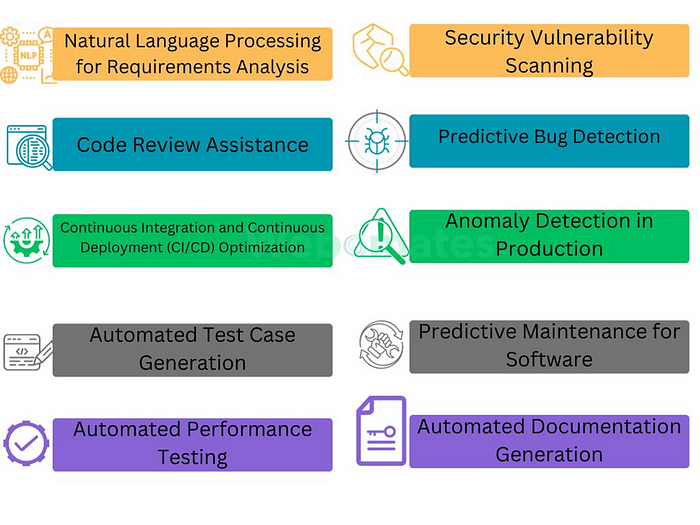Software and applications have become an integral part of every industry. According to Statista Market Insights, “The world software revenue was estimated to be around $659Bn in 2023.”
As good as it sounds, this major surge in software or application requirements has made it difficult for software teams to focus on quality and speed at the same time and this is when AI comes to the rescue. From driving high-performing software solutions to interactive applications, AI plays a very important role in the software development lifecycle.
According to this report from Market Research , the Software Quality Assurance Market is expected to register a CAGR of 9.6% and USD 14.01 billion by 2025. AI is one of the contributing factors to this growth.
This article focuses on how AI is helping developers and testers alike in making the software development process more efficient.
AI Use cases for Developers and Testers

Natural Language Processing for Requirements Analysis
According to an IAG consulting study, “Companies with poor requirements definition and management spend on average $2.24 million more per project on their major projects.”
In an Agile environment, it’s a daunting task to interpret ever changing customer requirements. This is when AI comes to the rescue by processing and analyzing product requirement documents with remarkable accuracy. AI-driven NLP algorithms extract essential information and can present the analysis in desired format, helping the teams comprehend project requirements more efficiently.
Code Review Assistance
Code reviews are crucial for maintaining code quality, but they can be time-consuming, if done manually. AI technology can help with code analysis, identify code quality issues, suggest improvements, and even automate some parts of the review process. This accelerates development cycles while ensuring higher code quality.
CodeScene, one of the top code reviewing tools of 2023 leverages AI to automate the entire process and provides instant feedback as well.
Continuous Integration and Continuous Deployment (CI/CD) Optimization
Efficient CI/CD pipelines are the backbone of modern software development. AI helps with codeless testing, offers better test coverage and also comes with a reliable defect management system. Apart from that it also offers fool proof tracing to debug efficiently.
Automated Test Case Generation
Manual test Case generation for multiple scenarios can be tedious and error-prone. Additionally, test case updation can be very challenging due to changes done to reflect bug fixes and incorporate new requirements. AI-based test automation saves time, increases testing efficiency, and reduces human error.
We at Webomates use generative AI extensively to accelerate our test case creation process thereby reducing efforts significantly. Want to know more? Read our blog “Generative AI is a game changer in Software Testing”
Automated Performance Testing
Performance testing measures, validates and verifies response time, stability, scalability, speed and reliability of a system. AI can automate performance testing, simulating thousands of users and identifying performance bottlenecks.
According to Dunn & Bradstreet, 59% of Fortune 500 companies have experienced 1.6 hours of downtime per week at the least. This has affected their revenue and brand reputation as well. Having AI based automated performance testing will prevent such issues and ensure smoother operation.
Security Vulnerability Scanning
Security is paramount in software development. AI can scan code for security vulnerabilities, including common issues like SQL injection or Cross-Site Scripting (XSS). Identifying and mitigating these vulnerabilities early can save both time and money.
Canva, a graphic design platform, has grown rapidly, and being a cloud company, it needed extra protection so that its tool wasn’t compromised, and this is when it deployed AI into its development process. This has helped them prevent some critical malicious attacks.
Predictive Bug Detection
AI can predict potential bugs in code before they become critical issues. By analyzing historical data and code patterns, it alerts developers to areas that may require extra attention. This proactive approach helps in delivering more reliable software.
Anomaly Detection in Production
In production environments, AI shines in detecting anomalies and issues. It monitors real-time data, identifying deviations from the norm and alerting operators when something goes wrong. This proactive monitoring minimizes downtime and enhances system reliability.
Capgemini has incorporated AI powered Anomaly Detection to identify any kind of deviations in the data logs during the development process. know more about this blog click on this link : AI Uses Every Developer/Tester
Conclusion
AI can simplify multiple tasks that are involved in the development lifecycle. Keeping up with the latest advancements is very important to ensure that you are ahead of the game.
If you are interested in transforming the way you have been testing and want to opt for a new, efficient, and faster process! Drop us a line at [email protected].
Tags: AI Testing, Artificial Intelligence, Intelligent automation, Intelligent Test Automation, Test Automation
